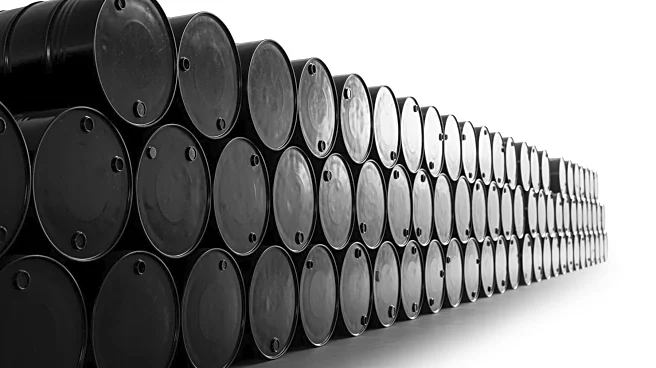What's Happening?
Oil prices have stabilized following concerns about an oversupplied market and ongoing trade disputes between the U.S. and China, the world's largest oil consumers. A preliminary Reuters poll suggests
that U.S. crude oil stockpiles likely rose last week, while gasoline and diesel inventories are expected to have decreased. This comes as oil prices hit their lowest levels since early May, driven by fears of oversupply and slowing economic growth due to the U.S.-China trade dispute. The market is also reacting to OPEC+'s plans to increase oil supply, which has contributed to the shift towards a contango market structure, indicating abundant near-term supply and declining demand.
Why It's Important?
The potential increase in U.S. crude oil stockpiles highlights ongoing concerns about market oversupply, which could impact global oil prices and economic stability. The trade dispute between the U.S. and China adds further uncertainty, affecting investor confidence and market dynamics. If stockpiles continue to rise, it may pressure oil prices downward, affecting the profitability of oil producers and related industries. Conversely, declining gasoline and diesel stocks could signal stronger demand, potentially stabilizing prices. The situation underscores the delicate balance between supply and demand in the global oil market.
What's Next?
The market will closely monitor upcoming reports from the American Petroleum Institute and the Energy Information Administration for confirmation of stockpile changes. Stakeholders, including oil producers and investors, will assess the impact of OPEC+'s supply plans and the U.S.-China trade dispute on future oil prices. Potential policy responses or trade negotiations could alter market conditions, influencing supply and demand dynamics. Analysts will watch for shifts in market structure, such as super contango, which could indicate significant oversupply and further price adjustments.
Beyond the Headlines
The evolving oil market situation may have broader implications for energy policy and international relations. As countries navigate trade disputes and supply challenges, there may be increased focus on energy independence and diversification. The situation could also prompt discussions on sustainable energy practices and the role of alternative energy sources in mitigating market volatility.









